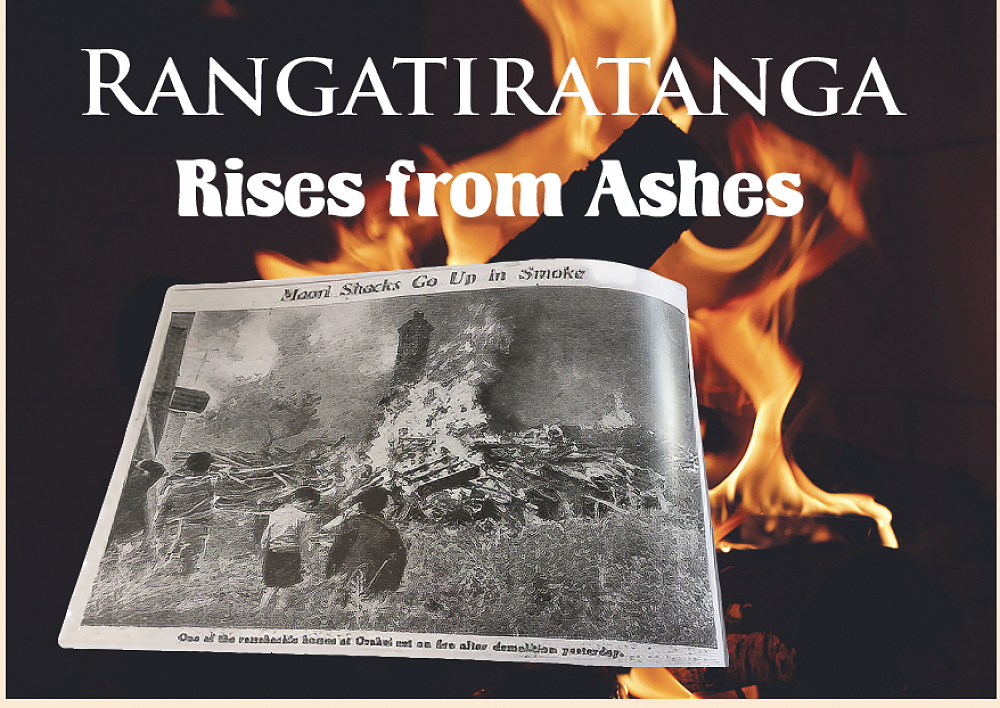
Rangatiratanga Rises from Ashes
The year was 1952. The NZ Weekly News headline told the story: “Maori Shacks Go Up in Smoke.” The caption beneath the photo was equally derisive: “One of the ramshackle houses at Orakei set on fire after demolition yesterday.”
I had been a Pākehā working with Ngāti Whātua o Ōrākei from 1982 and I had heard about the burning of their houses on the papakāinga/home base in 1952, but by chance in 2020 I came across the photo in a cafe. The shock of it was extraordinary.
This could have been the end of the story for Ngāti Whātua. Comprehensive defeat. Reduced to urupā/cemetery on Tāmaki Drive as its only land holdings. But that’s not how it worked out.
Sitting in a tree in 1952 watching the carnage was 12-year-old Joe Hawke. In 1975 Joe joined thousands to support Dame Whina Cooper leading the land march from Te Hāpua in the Far North to Parliament. Her wero was clear: “not one acre more” of Māori land was to be taken. In 1977 Prime Minister Muldoon moved to sell the land at Takaparawhau/Bastion Point and Joe and his whānau/family and some of the Ngāti Whātua hāpu/kinship group moved on the land to occupy and stop the sale.
This occupation riveted the nation and for 577 days they remained before their removal was gained by the greatest use of state force against a civilian population since the 1951 waterfront strike. All looked lost again, but they were not to be diminished. They had recovered their rangatiratanga, their right to make their own decisions and accept the consequences about shaping their future and they weren’t about to let the Crown thwart them again.
In 1987 they launched a claim with the Waitangi Tribunal (newly expanded in 1984 to look at claims going back to 1840 and the signing of Te Tiriti). In 1990 the tribunal ruled in their favour, famously describing Crown action as having made Ngāti Whātua ”refugees in their own land”. In 1992, 40 years after the burning of the houses, Takaparawhau returned to Ngāti Whātua.
Now, 30 years later, Ngāti Whātua holds its own mana whenua/power from the land over central Auckland. The hāpu base has now expanded from the quarter-acre urupa to a $2 billion enterprise of land and assets. There is widespread fluency in te reo Māori/language with their own kura/school and they have kaumātua and kuia/elders to populate the paepae/front seats and confidently offer hospitality and kōrero/oratory where previously they were at times without speakers of te reo.
Less than $30 million of their newfound financial security has come from the Crown through Te Tiriti settlements. It has come from their judicious use of landholding and other investment they have secured in their rohe/region since the treaty settlements. During the COVID pandemic Ngāti Whātua played a central role in providing vaccinations to Māori and the rest of us. They are a force to be reckoned with in business, education and health and their people are competent and confident as Māori and as citizens. They could have disappeared. Instead they are recovering and prospering.
This will be the future trajectory of the Māori Health Authority. The Government has now clearly heard the Māori clamour that says staying sick for longer because the health system is not designed well enough to meet their needs is no longer acceptable. Māori need the ability to chart their own journey to healthy outcomes and clearly have the ability to manage, provide and supply all that is required, provided they are treated fairly with the pūtea, the Crown money available to support Māori Health.
The recent budget announcements have supported Māori aspirations and the Māori Health Authority is underway with substantial levels of financial support. Those running this new authority will work hand in glove with Health New Zealand, commissioning care for Māori from the mothership.
This is a defining moment for our health system. It is akin to the explicit action taken by Ngāti Whātua to recover its whenua and prosper on its own terms in pursuit of its own rangatiratanga. As we have seen for Ngāti Whātua, taking control of your future, accepting the risks of failure, triumphing over difficulty and staying faithful to the kaupapa of self-determination has worked magnificently. It will do the same with the Māori Health Authority. Let’s pray that it does so.
I remember Joe Hawke, courageous Ngāti Whātua kaumātua and my friend, who died on 22 May 2022.
Tui Motu Magazine. Issue 271 June 2022: 3
